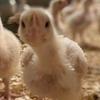Tryptophan: The link between poultry welfare & nutrition
Published: June 2, 2023
Source : Chantel Pennicott, University of Arkansas; Dr. Shawna Weimer, University of Arkansas. Reviewers: Dr. Prafulla Regmi, University of Georgia; Dr. Leonie Jacobs, Virginia Tech; Marisa Erasmus, Purdue University.

Tryptophan, Serotonin & Melatonin
Tryptophan (Trp) is an essential amino acid (AA), which is the building block of protein, therefore it cannot be synthesized by the body itself and must be obtained through food; it is important for many metabolic functions.
Trp supplementation improves broiler performance through increased body weight gain, reduced feed intake and improved feed efficiency. As a result, the supplementation of this essential amino acid has significant economic impacts on broiler production.
Besides the known requirements of Trp for growth, it also serves as a precursor to neuroendocrine messengers such as serotonin and melatonin, which can impact welfare.

Tryptophan & Response to Stress
A tryptophan deficiency could affect behavioral responses to stress. Severe feather pecking, an abnormal behavior in response to a multitude of stressors, is associated with serotonin levels. Trp could therefore play a role in the prevention of this abnormal behavior.

The figure below compares feather pecking genotypes and phenotypes. Both high-pecking genotypes and phenotypes had lower serotonin levels at a younger age in comparison to victims and neutral birds.

The Link Between Stress & The Gut
Distress negatively affects the health of all animals as their immune system is compromised.
The figure below illustrates the gut–brain axis, which refers to the bidirectional communication between the nervous system and the gut. When chickens experience chronic distress, the intestinal and immune cells transmit signals to the brain. These stimuli activate the hypothalamic–pituitary–adrenal (HPA) axis and increase the blood corticosterone levels. Chronic distress lowers serotonin levels and leads to sickness behavior in chickens.
A study confirmed the hypothesis that Trp enhances intestinal barrier function by regulating mucosal serotonin production in distressed broilers. Serotonin and Melatonin production are inherently linked.

The Effect of Tryptophan on Bird Responses During Handling & Transport
Handling and transport can result in both acute and chronic stress, depending on the scale of the operation and time it takes to catch and process chickens. The size of barns and number of birds are increasing, resulting in longer catching and processing times. Trp supplementation towards the end of the growing or laying period can reduce struggling during handling and in transit. Resulting in improved bird welfare and handler ease, as well as reduced number of dead on arrival (DOA), injuries and improved meat quality.

In summary:
Tryptophan can be used to link nutrition and poultry welfare
- Trp is an essential AA, precursor to serotonin & melatonin
- Trp enhances intestinal barrier function and immunity
- Trp supplementation can be used to:
1. Control behavioral responses to stress such as feather pecking
2. Improve coping ability during handling & transport
This article was originally published on Poultry Extension Collaborative (PEC) and it is reproduced here with permission from the authors.
Sources & Further Reading
Bello, A., Idrus, Z., Yong Meng, G., Awad, E.A. and Soleimani Farjam, A., 2018. Gut microbiota and transportation stress response affected by tryptophan supplementation in broiler chickens. Italian Journal of Animal Science, 17(1): 107-113.
Blair, R., Newberry, R.C. and Gardiner, E.E., 1993. Effects of lighting pattern and dietary tryptophan supplementation on growth and mortality in broilers. Poultry science, 72(3): 495-502.
Corzo, A., Kidd, M.T., Thaxton, J.P. and Kerr, B.J., 2005. Dietary tryptophan effects on growth and stress responses of male broiler chicks. British Poultry Science, 46(4): 478-484.
Herichova, I., Zeman, M. and Veselovský, J., 1998. Effect of Tryptophan Administration of Melatonin Concentrations in the Pineal Gland, Plasma and Gastrointestinal Tract of Chickens. Acta Veterinaria Brno, 67(2): 89-95.
Jerine A.J. van der Eijk, Aart Lammers, Joergen B. Kjaer, T. Bas Rodenburg., 2019. Stress response, peripheral serotonin and natural antibodies in feather pecking genotypes and phenotypes and their relation with coping style. Physiology & Behavior. 199: 1-10.
Kerr, B.J., Moran Jr, E.T. and Kidd, M.T., 2005. Effect of supplementary tryptophan prior to marketing on carcass quality in broilers. Journal of applied poultry research, 14(2): 306-314.
Linh, N.T., Guntoro, B. and Qui, N.H., 2021. Immunomodulatory, behavioral, and nutritional response of tryptophan application on poultry. Veterinary World, 14(8): 2244.
Masters, A., Pandi-Perumal, S.R., Seixas, A., Girardin, J.L. and McFarlane, S.I., 2014. Melatonin, the hormone of darkness: from sleep promotion to ebola treatment. Brain disorders & therapy, 4(1).
Mund, M.D., Riaz, M., Mirza, M.A., Rahman, Z.U., Mahmood, T., Ahmad, F. and Ammar, A., 2020. Effect of dietary tryptophan supplementation on growth performance, immune response and anti‐oxidant status of broiler chickens from 7 to 21 days. Veterinary Medicine and Science, 6(1): 48-53.
Newberry, R.C. and Blair, R., 1993. Behavioral responses of broiler chickens to handling: effects of dietary tryptophan and two lighting regimens. Poultry Science, 72(7): 1237-1244.
Sharideh, H. and Zaghari, M., 2021. Effect of dietary L-tryptophan supplementation and light-emitting diodes on growth and immune response of broilers. In Veterinary Research Forum, 12(1): 63
Jerine A.J. van der Eijk, Aart Lammers, Joergen B. Kjaer, T. Bas Rodenburg,, 2019. Stress response, peripheral serotonin and natural antibodies in feather pecking genotypes and phenotypes and their relation with coping style, Physiology & Behavior, 199: 1-10.
Yue, Y., Guo, Y. and Yang, Y., 2017. Effects of dietary l-tryptophan supplementation on intestinal response to chronic unpredictable stress in broilers. Amino Acids, 49: 1227-1236.
Wickramasuriya SS, Park I, Lee K, Lee Y, Kim WH, Nam H, Lillehoj HS., 2022. Role of Physiology, Immunity, Microbiota, and Infectious Diseases in the Gut Health of Poultry. Vaccines. 2022. 10(2): 172.
Related topics:
Authors:




Show more
Influencers who recommended :
Luis Fernando Vergamini LunaRecommend
Comment
Share

Would you like to discuss another topic? Create a new post to engage with experts in the community.




















